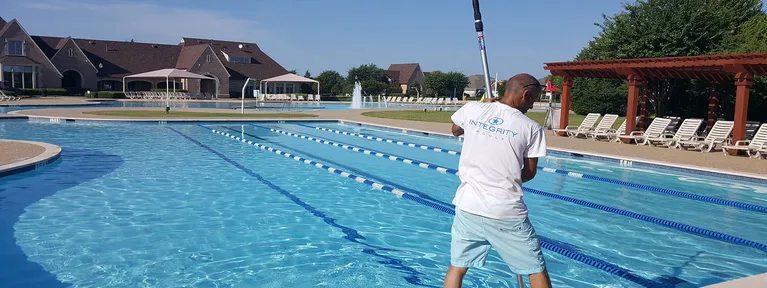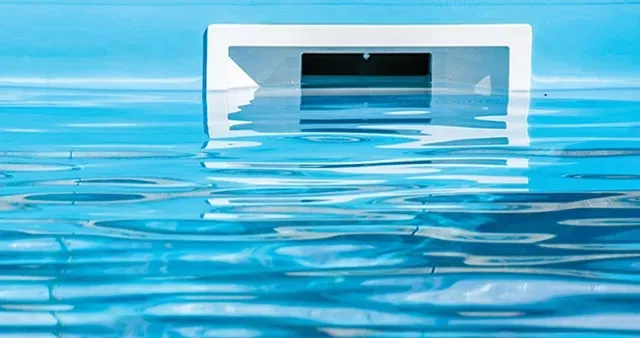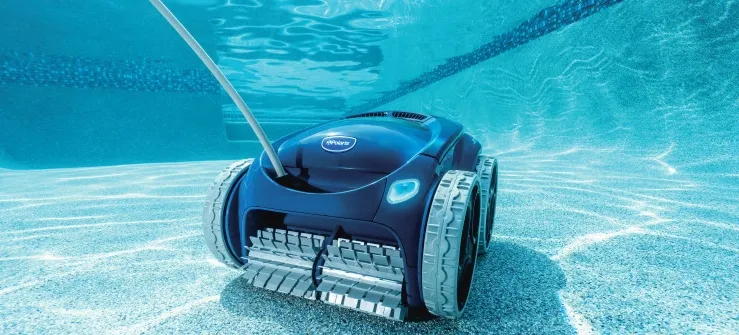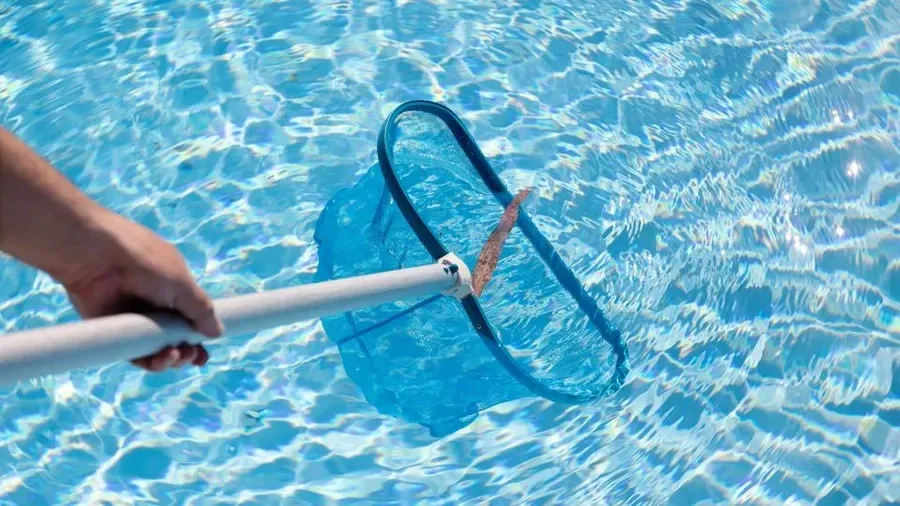THE IMPORTANCE OF WEEKLY POOL MAINTENANCE

Maintaining the water level in your pool
This is the easiest first step. Without the proper water level recommended halfway up your pool skimmer, you could burn up your pump if it is too low or block your skimmer door from operating as it should. No matter what your pool size is, your water level should be halfway up your skimmer plate. Just to remind you, your skimmer is the rectangular opening that is built onto the size of your pool wall and connects to your greater circulation system. That means that water travels from your pool through your skimmer, through your pool lines, back to your pump and filter, and out through your return jets. And that entire system goes a lot more smoothly if your skimmer is only halfway full of water.

Vacuuming the pool
Vacuuming your pool is to get your basic dirt and debris out of the pool. If left unattended, this build-up can cause algae, leading to sanitary concerns
Manual Vacuum– This is the quickest way to vacuum your swimming pool. Manually vacuuming does take some elbow grease. You accomplish this by attaching your telescopic pole to a vacuum hose and a vacuum head. Then you put one end of the vacuum hose into the skimmer or designated suction line. Turn on the pump because we are actually using our pump as the source of suction. Then get to work!
Pressure Side Automatic Pool Cleaners- A lot of pool owners opt for an automatic pool vacuum to do the dirty work. Remember, all pool vacuums are designed to keep a clean pool clean. Pressure side cleaners are becoming less and less popular. This is because you need a separate booster pump to operate them. You also need a dedicated pressure line. They use the pressure from the pump to propel themselves around your swimming pool. They have a self contained bag which catches the debris so you will need to empty it when it gets full.
Robotic Cleaners- These are considered to be “the best” type of automatic pool cleaner and one of the quicker ways to vacuum. With a robotic cleaner, you just plug it into a standard 110v outlet and drop it into the pool. Robotic cleaners are completely self contained, meaning no extra strain on your pump or filter. Inside you will find a canister that catches all of the dirt and debris. Depending on the brand, the cleaning cycle could be as little as 2 hours! Once the pool is clean, you remove the cleaner and empty the canister and then it goes out of sight and out of mind. No need to deal with feet of hose always hanging out in your swimming pool. Robotic cleaners come with a cleaner head, a cord and an ebox to control it. Some modern cleaners even use bluetooth to allow you to control the cleaner. You can even do it remotely! These cleaners are the only cleaners designed to climb the walls. You can set them to do floors, walls or tile line.

Skimming your pool
This is another weekly task for your schedule. Skimming removes that top layer of the debris your vacuum can’t get.

Chemical Balance Matters
It’s been a longtime dream of pool owners that their water could just naturally repel algae, bacteria, and other seriously gross contaminants. Unfortunately, it’s still a dream. In fact, untreated water is the perfect breeding ground for just that: microorganisms that could potentially even make you sick love to live in natural water.
Checking your chemical balance every week is a preventative measure—it’ll save you big time in the long run. Because untreated pool water left for even a short amount of time can lead to a bacteria and algae infestation, do damage to your actual pool, and require a ton of remediation later.
1. ph
pH level tells you whether your water is too acidic or too basic. But what does that really mean? How does pH affect you?
Think about your eyes. Our tears are pH neutral. When they have a low pH, your eyes burn when you cry like that time when your team lost the big game AGAIN. And if the pH in your eyes was high, they feel painfully dry.
Why is this something you need to keep your eye on? pH is naturally unstable in water because water absorbs so many different things. Rainwater will change it. What about your friends taking a dip? Yep. They affect it. Just about anything that enters the water can affect the pH level.
When pH is low, it means your water is acidic. When it’s high, you water is basic. The proper level for your water is 7.4 to 7.6.
How do you maintain the proper level? Well first you need to buy a container of pH increaser and pH decreaser. Then make sure that you have all the right information about the pH balance and amount of water in your pool.
Now that you know how much pH increaser or decreaser you need to create chemical balance in your pool, add a measured amount directly to the water.
2. Alkalinity
Alkalinity is a pH buffer. That means it helps to prevent drastic changes in the pH level in your pool water as it absorbs everything that’s thrown its way. Alkalinity is your prime time pool defender.
How do you build a solid defense? Good offense. Buy some Sodium Bicarbonate, an alkalinity increaser. Add it directly to your pool water. The proper level to maintain is 100 – 150 ppm.
Make sure to hold onto a hefty supply of alkalinity increaser on hand since this reading can fluctuate. Baking soda will also raise the alkalinity and pH of your pool.
It’s crucial to keep a lockout for your pH and alkalinity levels. Check at least once a week by using a test kit or test strips.
When your pH and alkalinity are low, use alkalinity increaser to raise both. If the pH doesn’t reach 7.4, you might have to add a little pH increaser. When your pH and alkalinity are both high, pH decreaser will lower both. When only your alkalinity is high, your pH will also be high so you can use pH decreaser for both.
3. Calcium Hardness
Just like how calcium is good for bones, it’s good for your pool. Adding calcium hardness to your pool water helps defend your pool walls and equipment from chemical imbalance.
Don’t over do it though. Only add Calcium Hardness Increaser once in the beginning of the season. Make sure to pre-dissolve it before adding the chemical to your pool water. If the calcium in your water is too high, you will have to dilute the water. That’s extra you don’t want to waste your time with!
The proper level of Calcium Hardness depends of the material basis of your pool. 200 to
275 ppm is the range for concrete pools while 175 to 225 ppm is what you’re aiming for all other types of pools.
Pool Filter Cleaning
Dirty or ineffective filters are one of the leading causes of major pool equipment failure. Your filters should be properly cleaned on a regular schedule.
Cleaning schedules should be adjusted based on your pool environment and the condition of your equipment. Not cleaning your pool filter on a regular basis can lead to damage to your existing filter requiring replacement sooner than it would otherwise be necessary.
Cartridges filters – every three months
DE filters – every six months
